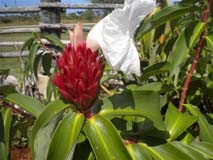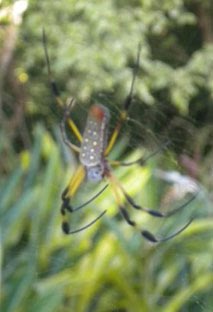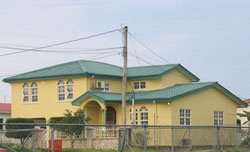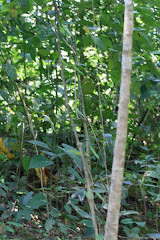 A few days ago I went to visit my mom and dad in my home town Dongen in the south of Holland. Leaving our rental car in Belgium so my husband could easily go to the hospital every day, I took the train with my all-excited daughter Soleine. The total distance of 165 km, or just over 100 miles took me almost as long as the flight from Belize to Germany, but anyhow, after eight hours I was happy to see my brother at the train station.
A few days ago I went to visit my mom and dad in my home town Dongen in the south of Holland. Leaving our rental car in Belgium so my husband could easily go to the hospital every day, I took the train with my all-excited daughter Soleine. The total distance of 165 km, or just over 100 miles took me almost as long as the flight from Belize to Germany, but anyhow, after eight hours I was happy to see my brother at the train station.He lends me a bicycle to get around in Dongen. It's an 'Omafiets' (literally: Granny bike), in English also referred to as a European City Bike, designed for mothers to take at least two children and three bags full of groceries. Like all children in Holland I grew up riding a bicycle daily, and although I have not biked in years, I get back my pedaling rhythm immediately. Soleine can not yet ride, which is actually a bit shameful for a 5-year old Dutch girl. The awful state of the roads in Belmopan is my only excuse for not teaching her properly.
Last Friday she hopped on the back of my bike and off we went. We've done it before, as have millions of mothers before me. But that bloody Friday it all went wrong. Soleine's left foot gets stuck in the back wheel, and it takes me a few seconds to realize what's going on when she starts squealing. Blood seeps through her sock and as I take a peek I nearly puke. Something white and rubbery is sticking out of her heel, and I realize it's serious. I feel terrible. Luckily, we are just near my mothers retirement home which has a Family Practice right next to it. The doctor can see us immediately. 'A spoke wound', he says (or spoke - ha ha), 'very common', and he knows exactly what to do. He checks the Achilles tendon, which turns out to be damaged but not ripped, and we have x-rays to ensure that the calcanues, or heel bone, has no fractures. He sews the wound with five big black stitches, prescribes some prophylactic antibiotics and reassures me that this happens very often in the Netherlands and that it's not my fault (...). Well, it doesn't feel that way but I know what to do now. As soon as she can walk again I will have to teach her how to ride a bike, for safety reasons and to keep her healthy. Because bicycling makes my country one of the most healthy ones in the world.


































No comments:
Post a Comment